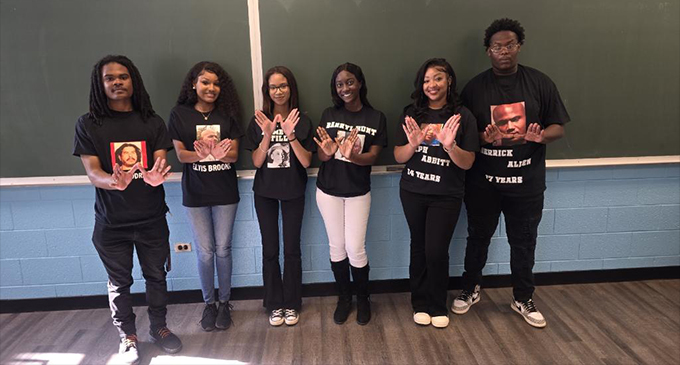College course teaches students about faults in criminal justice system – WS Chronicle
College course teaches students about faults in criminal justice system Winston-Salem Chronicle


Dr. Radscheda Nobles and her Impactful Class Project

Introduction
Dr. Radscheda Nobles, a highly respected professor at Winston-Salem State University (WSSU), has been teaching at the university for the past six years. Her classes have garnered significant admiration from her students, and one particular class project has sparked immense interest among them.
The Class Project
For Nobles’ class, Victims and Crime, the students participate in a class project each semester.
“I noticed a gap in our department’s support for the community,” said Nobles. “Since we don’t have much time to address it as a department, I decided to incorporate it as a class project. Every class undertakes a project, which may involve feeding the homeless or engaging in various community activities.”
Nobles emphasizes the importance of her students researching different agencies in the area to understand their specific needs. She believes that it is crucial to involve the community in the decision-making process rather than making assumptions.
The Semester’s Project: Wrongful Convictions
This semester, Nobles chose to have her students research cases of individuals who were wrongly convicted of crimes, served time in prison, and were later exonerated. However, the project took on a life of its own and expanded beyond her initial expectations. The students delved deeper into the project, creating T-shirts, sharing their findings with the student body and chancellor, and even organizing a fashion show.
“My students are accustomed to my community projects, and they grow bigger every year,” Nobles explained. “This particular project was more challenging, but I knew it was necessary.”
According to Nobles, her students exceeded her expectations and gained valuable insights throughout the project.
Impact on Students’ Perspectives
Sophomore Javaryon Bruton expressed how the project opened his eyes to the imperfections of the American justice system. While it did not change his overall view, it highlighted the need for change and increased awareness about those who have been victimized by the system.
Senior Yasmyne Vann shared that the project deepened her understanding of a topic she already had knowledge about. It also influenced her career goals, as she now aspires to become a prosecutor to advocate for fair sentencing and help those who have been falsely accused.
Iverson Brown played a crucial role in driving the project forward. The experience made her realize the importance of publicly showcasing initiatives like the Innocence Project, and she expressed a desire to collaborate with them in the future to ensure proper rehabilitation for incarcerated individuals.
Jada Jones strongly advocated for change in the criminal justice system. She questioned the purpose of prisons: whether they should focus on punishment or rehabilitation. Her passion for reform was evident throughout the project.
Continuing the Lessons and Future Impact
Many of Nobles’ students expressed a desire to carry forward the lessons they learned in her class. The ripple effects of this project could potentially influence how wrongly convicted individuals are treated in the local community. This outcome holds great significance for Nobles, as she is deeply committed to making a positive impact.
SDGs, Targets, and Indicators
-
SDG 16: Peace, Justice, and Strong Institutions
- Target 16.3: Promote the rule of law at the national and international levels and ensure equal access to justice for all.
- Indicator: Number of people exonerated after being wrongly convicted of a crime.
-
SDG 10: Reduced Inequalities
- Target 10.3: Ensure equal opportunity and reduce inequalities of outcome, including by eliminating discriminatory laws, policies, and practices.
- Indicator: Number of individuals wrongly convicted and incarcerated due to discriminatory laws or practices.
-
SDG 4: Quality Education
- Target 4.7: Ensure that all learners acquire the knowledge and skills needed to promote sustainable development.
- Indicator: Number of students engaged in community projects that address social issues.
Analysis
The article addresses or connects to the following SDGs:
- SDG 16: Peace, Justice, and Strong Institutions – The article discusses a class project focused on researching individuals who have been wrongly convicted of a crime, spent time in prison, and were later exonerated. This project aims to promote equal access to justice and highlights the imperfections of the criminal justice system.
- SDG 10: Reduced Inequalities – The article mentions that more brown people are convicted and fall under the traps of the criminal justice system. The project aims to shed light on the inequalities and discriminatory practices within the system.
- SDG 4: Quality Education – The article highlights the class project as a means of engaging students in community projects that address social issues, promoting sustainable development through education.
Based on the article’s content, the specific targets under these SDGs can be identified:
- Target 16.3: Promote the rule of law at the national and international levels and ensure equal access to justice for all.
- Target 10.3: Ensure equal opportunity and reduce inequalities of outcome, including by eliminating discriminatory laws, policies, and practices.
- Target 4.7: Ensure that all learners acquire the knowledge and skills needed to promote sustainable development.
The article also mentions or implies indicators that can be used to measure progress towards the identified targets:
- Indicator: Number of people exonerated after being wrongly convicted of a crime – This indicator reflects progress towards ensuring equal access to justice and promoting the rule of law (Target 16.3).
- Indicator: Number of individuals wrongly convicted and incarcerated due to discriminatory laws or practices – This indicator reflects progress towards reducing inequalities and eliminating discriminatory laws, policies, and practices (Target 10.3).
- Indicator: Number of students engaged in community projects that address social issues – This indicator reflects progress towards providing quality education and promoting sustainable development (Target 4.7).
SDGs, Targets, and Indicators
| SDGs | Targets | Indicators |
|---|---|---|
| SDG 16: Peace, Justice, and Strong Institutions | Target 16.3: Promote the rule of law at the national and international levels and ensure equal access to justice for all. | Number of people exonerated after being wrongly convicted of a crime. |
| SDG 10: Reduced Inequalities | Target 10.3: Ensure equal opportunity and reduce inequalities of outcome, including by eliminating discriminatory laws, policies, and practices. | Number of individuals wrongly convicted and incarcerated due to discriminatory laws or practices. |
| SDG 4: Quality Education | Target 4.7: Ensure that all learners acquire the knowledge and skills needed to promote sustainable development. | Number of students engaged in community projects that address social issues. |
Copyright: Dive into this article, curated with care by SDG Investors Inc. Our advanced AI technology searches through vast amounts of data to spotlight how we are all moving forward with the Sustainable Development Goals. While we own the rights to this content, we invite you to share it to help spread knowledge and spark action on the SDGs.
Fuente: wschronicle.com

Join us, as fellow seekers of change, on a transformative journey at https://sdgtalks.ai/welcome, where you can become a member and actively contribute to shaping a brighter future.







